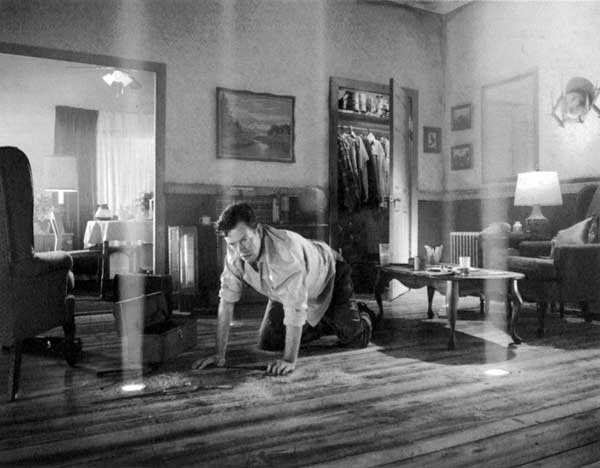For ‘Flash Art’ Magazine
Gregory Crewdson grew up in Brooklyn, far removed from the wooded hills and neatly mown lawns that provide the backdrop for his photographs of small town America. The distance is all the better to spur his imagination as he creates the highly detailed scenes that have been compared to stills from an alien abduction film. This is the second solo show of work from the ‘Twilight’ series, on which the artist has worked for four years, and which was shot in the waning daylight or at night. In each photo, individuals or groups of citizens stand frozen in time, pausing in disbelief at some supernatural intervention or freak occurrence.
The new photographs still evoke an eerie ‘not quite right’ feel but with a fairy tale twist. In one scenario, a man has just abandoned his car, stripped out of his drab brown suit, and started to climb a gigantic flowering vine. Elsewhere, a strong searchlight (or alien spacecraft’s tractor beam?) cuts through the night illuminating a sky full of butterflies. During the day, dazed young people construct a mountain of flowers in the middle of the street. Prompted by the unnatural events, some characters lose their inhibitions or senses, like the nude and dripping wet, mother who enters the dining room while her husband and two teenage kids finish dinner.
The recent pictures lack the gore and direct menace of some of Crewdson’s earlier photographs, in which decaying human and animal bodies were not uncommon. The one cadaver that does turn up is that of a young woman, in a classic Ophelia pose, floating face up in a flooded living room. In general, the photographs are beautifully lit and the subject matter is tantalizing, but the townspeople seem to have lost their ability to respond. They are alive but stunned; there is little action and almost no emotion evident on their faces, which does nothing to create sympathy in the viewer. They wander stunned, like Hamlet’s Ophelia in her insanity before she drowned, their blank stares proving King Claudius right when he said, “Poor Ophelia. Divided from herself and her fair judgment without the which we are pictures, or mere beasts.”